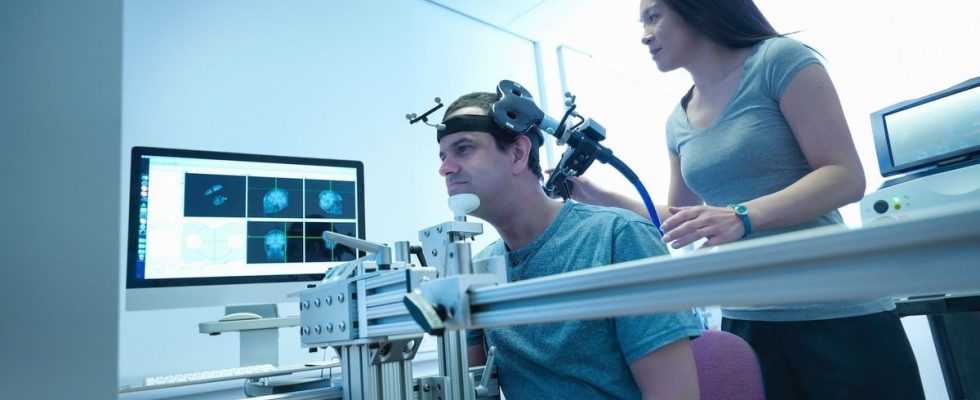Published on
Updated
Reading 2 min.
in collaboration with
Wilfrid Casseron (Neurologist)
The main treatments used for depression are antidepressants and psychotherapies. But they are sometimes ineffective in the face of certain severe depressions. Transcranial magnetic stimulation seems to give good results, according to the conclusions of a British study.
It is estimated that 5 to 15% of the French population will be affected by depression, a third of whom will not find comfort in antidepressants or psychotherapies. For these patients, solutions have long been limited, apart from electroconvulsive therapy (ECT), electroshock. But this technique remains controversial because of its side effects. Today, a “gentler” technique seems to give good results: transcranial magnetic stimulation.
A third of depression is resistant to treatment
Depression is a mental pathology that presents different stages. Sometimes, patients with severe disease do not respond to traditional treatment. For these patients with treatment failures, researchers at the University of Nottingham, in the United Kingdom, tested transcranial magnetic stimulation.
In this trial, they brought together 255 patients suffering from depression resistant to different treatments by subjecting them to around twenty sessions of transcranial magnetic stimulation, lasting thirty minutes, over four to six weeks. Before these sessions, the patients were subjected to an MRI, to allow researchers to locate the brain areas involved.
Magnetic stimulation using neuronavigation
To deliver the treatment to the right place in the patients’ brains, the researchers relied on a neuronavigation system, which is a kind of 3D GPS allowing the location of the area where transcranial magnetic stimulation should be carried out. The patients, seated in a chair and conscious, during the therapy, received powerful magnetic pulses on the left side of the head.
“MRI personalizes the stimulation site, then neuronavigation ensures that the same site is stimulated in each treatment session. This reduces the variability of stimulation in each session.” explains Professor Richard Morriss, psychiatrist at the University of Nottingham Medical School. “Because the magnetic pulse can be concentrated, there are usually only minor, short-lived side effects. The person can return to daily activities immediately after leaving the hospital.”.
Two thirds of patients respond to treatment
The results of this work, some patients of which were followed for up to 6 months, show that two thirds of the patients responded to the treatment. In detail, a third saw their symptoms improve by 50%, while a fifth of patients entered remission and remained there. “Given that these patients are people who have not responded to two previous treatment attempts and have been ill for an average of seven years, achieving such a strong response rate is really encouraging.” believes Professor Morriss.
An observation shared by Dr Wilfrid Casseron, neurologist in Aix-en-Provence. “Transcranial magnetic stimulation is a technique whose effectiveness has been demonstrated by numerous publications, particularly in neuropathic pain and depression. But unfortunately, it remains difficult to access, particularly in the private sector, because there is no coding allowing these acts to be rated. deplores the doctor. “In addition, the technique causes few side effects and remains minimally invasive, which represents two important advantages.“.
According to the study’s findings, transcranial magnetic stimulation also had effects on “concentration, memory, anxiety“patients and in general about their”quality of life“. Faced with these depressions which are very difficult to manage, ketamine also seems to constitute a possible alternative.

